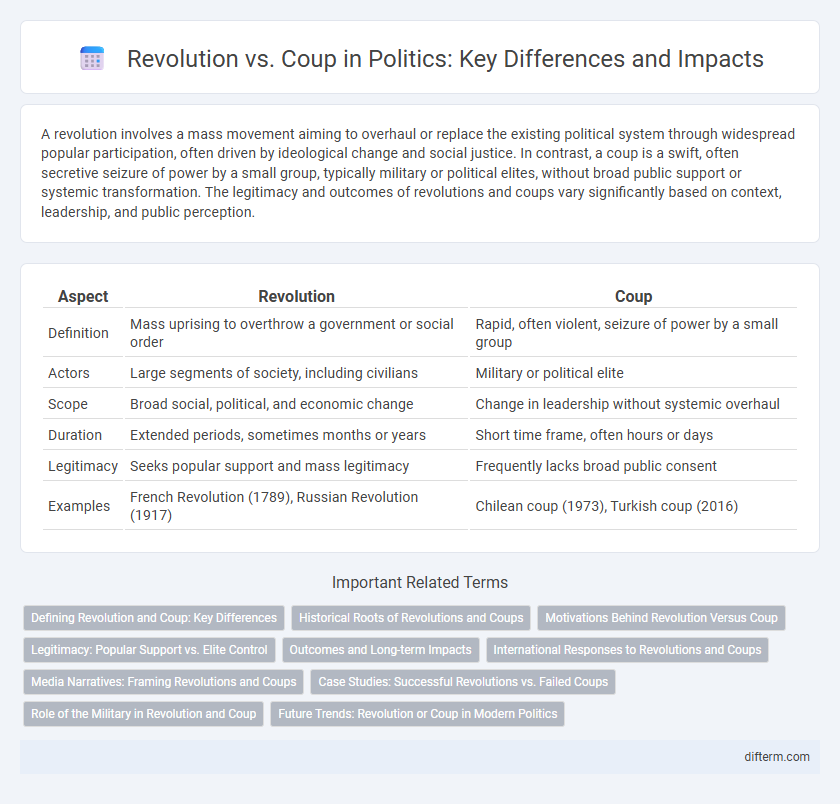A revolution involves a mass movement aiming to overhaul or replace the existing political system through widespread popular participation, often driven by ideological change and social justice. In contrast, a coup is a swift, often secretive seizure of power by a small group, typically military or political elites, without broad public support or systemic transformation. The legitimacy and outcomes of revolutions and coups vary significantly based on context, leadership, and public perception.
Table of Comparison
| Aspect | Revolution | Coup |
|---|---|---|
| Definition | Mass uprising to overthrow a government or social order | Rapid, often violent, seizure of power by a small group |
| Actors | Large segments of society, including civilians | Military or political elite |
| Scope | Broad social, political, and economic change | Change in leadership without systemic overhaul |
| Duration | Extended periods, sometimes months or years | Short time frame, often hours or days |
| Legitimacy | Seeks popular support and mass legitimacy | Frequently lacks broad public consent |
| Examples | French Revolution (1789), Russian Revolution (1917) | Chilean coup (1973), Turkish coup (2016) |
Defining Revolution and Coup: Key Differences
A revolution involves a widespread, often grassroots movement aiming to fundamentally change political, social, or economic structures, typically with broad popular support and mass participation. In contrast, a coup d'etat is a sudden, illegal seizure of power executed by a small group, usually military or political elites, without mass involvement or systemic transformation. Key differences lie in the scale of participation, objectives, and legitimacy of the processes involved in overthrowing an existing regime.
Historical Roots of Revolutions and Coups
Revolutions often emerge from widespread social, economic, and political grievances deeply rooted in historical patterns of inequality and oppression, reflecting mass mobilization and collective aspirations for systemic change. Coups typically arise from power struggles within political or military elites, frequently exploiting moments of institutional weakness without broad popular support. Historical analysis reveals that revolutions transform societal structures over extended periods, whereas coups result in rapid shifts in leadership with limited alteration of underlying political frameworks.
Motivations Behind Revolution Versus Coup
Revolutions are typically driven by widespread popular discontent aiming for systemic change and social justice, reflecting grassroots motivations and collective aspirations. In contrast, coups are usually orchestrated by a small group of elites or military leaders seeking to seize power rapidly without broad public support. The fundamental difference lies in the revolution's pursuit of transformative reform versus the coup's objective of power consolidation.
Legitimacy: Popular Support vs. Elite Control
Revolutions derive legitimacy primarily from widespread popular support, reflecting a collective demand for systemic change fueled by grassroots movements. Coups rely on elite control, typically executed by a small group within the military or political hierarchy, often lacking broad public endorsement. The durability of revolutionary governments hinges on sustained popular legitimacy, while coup regimes struggle to maintain authority without mass acceptance.
Outcomes and Long-term Impacts
Revolutions often lead to widespread social transformation and systemic change by mobilizing popular support and addressing root grievances, which can result in lasting reforms or new political paradigms. Coups typically involve the rapid seizure of power by a limited group, often maintaining existing structures or installing authoritarian regimes, leading to political instability or repression. Long-term impacts of revolutions tend to include institutional restructuring and increased civic participation, whereas coups frequently result in weakened democratic institutions and potential cycles of unrest.
International Responses to Revolutions and Coups
International responses to revolutions often involve widespread diplomatic support and humanitarian aid, reflecting global endorsement of popular movements for democratic change. Conversely, coups typically provoke swift condemnation, economic sanctions, and suspension from international organizations due to the abrupt seizure of power undermining constitutional order. Countries and multilateral institutions prioritize legitimacy and stability, influencing their strategic decisions in recognizing new regimes or supporting transitional governments.
Media Narratives: Framing Revolutions and Coups
Media narratives significantly influence public perception by framing revolutions as popular, grassroots movements while portraying coups as abrupt, elite power grabs. Journalistic language and imagery often emphasize legitimacy and moral authority in revolutions, contrasting with the portrayal of coups as illegitimate seizures of power. This framing affects international response, domestic support, and the historical legacy assigned to political upheavals.
Case Studies: Successful Revolutions vs. Failed Coups
The 1917 Russian Revolution exemplifies a successful revolution where mass popular support and organized leadership led to dramatic political transformation. In contrast, the 2000 Venezuelan coup attempt failed due to limited military backing and lack of widespread public endorsement. These case studies highlight how sustained grassroots mobilization and legitimacy critically determine the outcome of revolutionary movements versus coup d'etats.
Role of the Military in Revolution and Coup
The military plays a decisive role in both revolutions and coups, often determining the success or failure of these movements. In revolutions, the military may either support popular uprisings or suppress them, influencing the regime's stability. Coups typically involve direct military intervention where senior officers seize control without broad public involvement, emphasizing the armed forces' pivotal influence in political power shifts.
Future Trends: Revolution or Coup in Modern Politics
Future trends in modern politics indicate a growing complexity between revolutions and coups, with technology and social media amplifying mass mobilization and rapid information dissemination. Coups increasingly rely on strategic control of military and communication infrastructures, while revolutions emphasize widespread grassroots participation and digital activism. Analysts predict hybrid forms of political upheaval will dominate, blending conventional force with decentralized, networked resistance movements.
revolution vs coup Infographic

 difterm.com
difterm.com